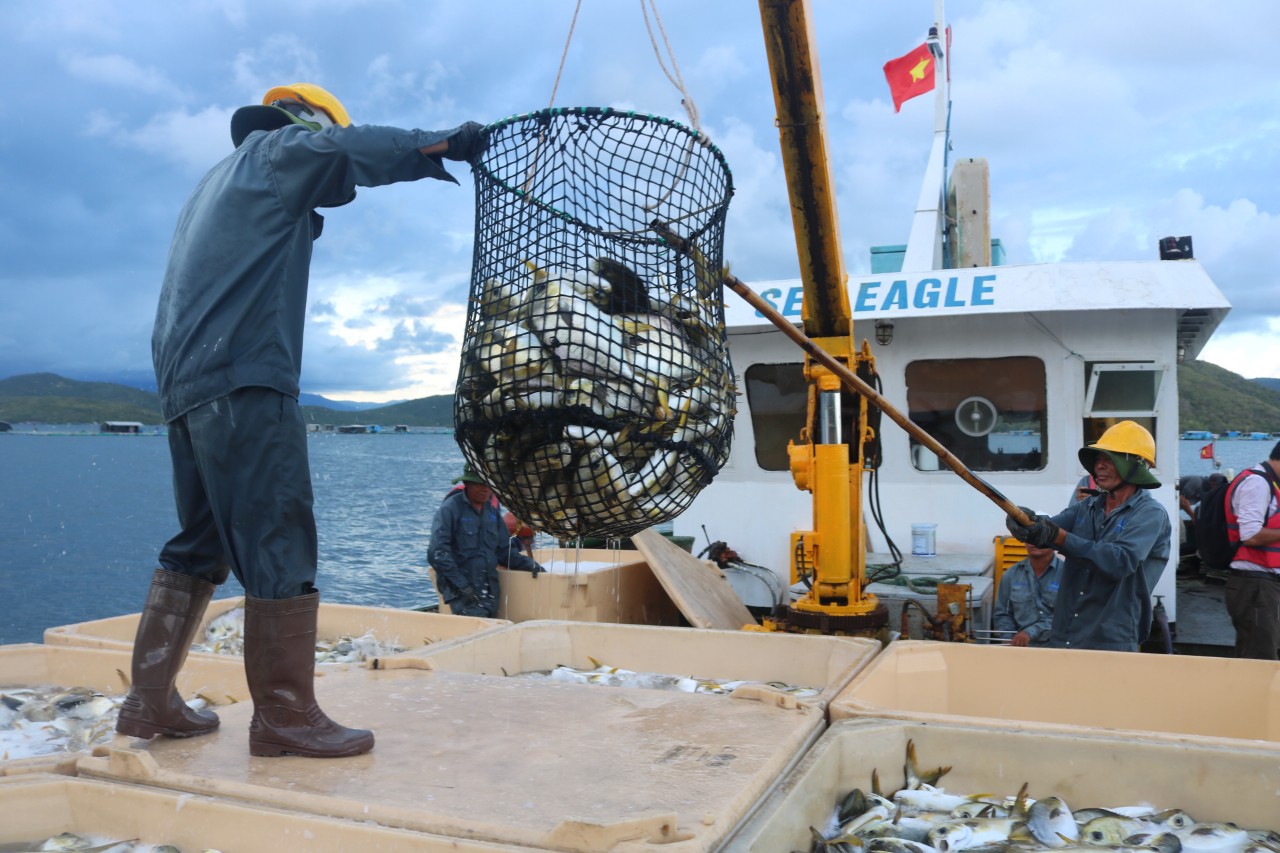Pilot development of high-tech marine farming
(BNP) - Deputy Prime Minister Tran Hong Ha has just signed and issued Decision No. 231/QD-TTg approving the pilot project to develop high-tech marine aquaculture in Khanh Hoa.

Illustrative photo.
The general objective of the Project is to develop marine aquaculture (sea farming) in Khanh Hoa province in the direction of: (1) contributing to increasing productivity, value of the aquaculture industry and raising income of marine farmers and other related organizations and individuals through job creation, improving socio-economic conditions, aiming at exporting high-standard aquatic products, ensuring food safety, meeting the needs of the domestic and export markets; (2) protecting the marine environment, aiming at developing a sustainable marine economy, gradually forming a marine farming area from 3 to 6 nautical miles, both ensuring marine economic development and reducing pressure on coastal marine farming; (3) ensuring to minimize conflicts over development space between economic sectors in marine farming areas.
The pilot period of high-tech marine farming is until the end of 2029, with specific goals:
- Sea area up to 3 nautical miles: pilot area for developing high-tech marine farming reaches 240 hectares, output reaches more than 3,600 tons.
- Sea area from 3 to 6 nautical miles, pilot area for developing high-tech marine farming reaches 200 hectares, output reaches more than 5,100 tons.
Developing seed production for high-tech marine farming
The tasks of the Project include: Developing seed production for high-tech marine farming; developing commercial farming technology; environmental monitoring, proactive disease prevention, adaptation to climate change; marine farming logistics services; converting marine farming technology to 3 nautical miles.
In particular, the project prioritizes research and selection of breeds for marine farming in accordance with the province's development plan, focusing on: Marine fish groups (grouper, sea bass, yellowfin pomfret); Crustacean groups (green lobster, spiny lobster); Mollusc groups (squid, oysters, etc.); Seaweed groups (yellow thread garnet, cartilaginous seaweed, jam seaweed, seaweed, etc.) and other objects for marine farming.
Strictly manage the exploitation of aquatic species, paying special attention to the protection and reasonable exploitation of some marine species that depend on natural sources (such as spiny lobsters and green lobsters), ensuring no harm to natural resources and sustainable development.
At the same time, apply and develop advanced technologies such as: Internet of Things (IoT) technology to monitor livestock and security, solar energy technology, automatic feeding technology, automatic environmental monitoring technology, new material technology in marine farming to create value-added products, protect the environment and develop green.
Develop criteria and classify cages at different levels of standards and high technology (suitable for the area, farming area, farming scale, storm resistance level, etc.) to apply in the province.
Research and apply measures to protect the safety of cages and rafts, and the safety of workers participating in marine farming in the face of unfavorable weather conditions (wind, storms, etc.); research, apply and develop multi-object integrated marine farming, combined with marine tourism in the specific conditions of Khanh Hoa province's sea area...
Applying 4.0 technology to improve the effectiveness of environmental monitoring, early warning of environmental impacts and disease prevention
The project applies the achievements of 4.0 technology to improve the effectiveness of monitoring, early warning of environmental impacts and disease prevention in marine farming objects. Towards building and operating a proactive monitoring system for early warning of environmental and marine farming diseases.
Investing and applying achievements of the 4th industrial revolution to management and production in concentrated marine farming areas, limiting risks, adapting to climate change, ensuring sustainable production development...






